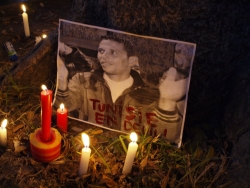Tunisia and Beyond Feature: Remembering Mohamed Bouazizi
 A year ago last Saturday, Tunisian market-seller Mohamed Bou'azizi doused himself in gasoline and set himself alight. He died 18 days later from the burns.
A year ago last Saturday, Tunisian market-seller Mohamed Bou'azizi doused himself in gasoline and set himself alight. He died 18 days later from the burns.
Mohamed's death has been perceived as the starting point of subsequent uprisings, not only in Tunisia but across North Africa and the Middle East. If the symbolic weight of Mohamed's act has yet to be fully realised, the tangible outcome of his sacrificial act was both the coalescence of anger and despair with the Ben Ali regime and the capacity to spark and inspire multitudes within and beyond national boundaries.
Central to Mohamed's death were his material conditions as father and family breadwinner, a situation which left him feeling bereft of any alternative but a profound public wail of rage through self-immolation. In a post-Ben Ali Tunisia, and a Middle East and North Africa fraught with uncertainties, that must not be lost in the search for narratives to explain the so-called Arab Spring. There are some straightforward causes at its core: the fundamental wish of people to live and work and earn --- and simply be --- with the guarantee of certain basic freedoms and opportunities, rather than to suffer under unelected tyrannies and to endure systems of repression.
 Aaron Bady,
Aaron Bady,  Arab Spring,
Arab Spring,  Mohamed Bou’azizi,
Mohamed Bou’azizi,  Rami Khouri,
Rami Khouri,  Tunisia,
Tunisia,  Zunguzungu
Zunguzungu 
